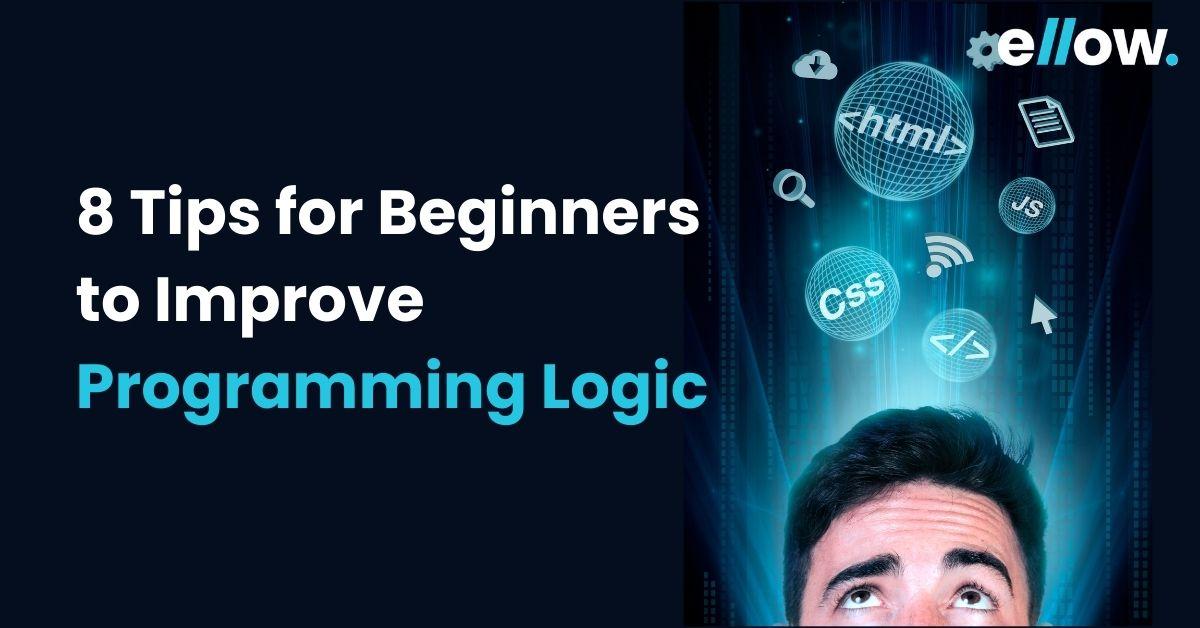Programming logic forms the basis for all the code. It is about how we think and structure the programs to make them work efficiently and flawlessly. Good programming logic can enhance code quality, making the code more robust and bug-free. Thereby boosting efficiency by allowing you to write more concise and organized code.
In fact, according to a HackerRank 2023 Developer Skills Report, 70% of employers say that problem-solving skills are more important than programming language knowledge.
Whether you are aspiring to be a web developer, app creator, or software engineer, these eight beginner-friendly tips will help you grasp the fundamentals of programming logic and set you on the path to becoming a skilled programmer.
Essential Tips for Improving Your Programming Logic Skills
1. Practice Regularly and Consistently
When it comes to enhancing the programming logic, there is a famous saying that goes, “Practice makes perfect.” This holds true for programming as well. Regular and consistent practice is important. It is the key to improving your logic-building skills.
The essential part of the process is to keep coding vigorously and writing solutions regularly. This routine helps sharpen your logical thinking and problem-solving skills.
2. Learn Data Structures & Algorithms
I. Data Structures
When you learn about data structures, you are essentially exploring different ways to organize and store data in your programs. This allows you to choose the most efficient data structure for a specific task, making your code run faster and use less memory.
For example, one might examine how arrays, linked lists, or trees work and why one might be more suitable for a particular problem than the others. This process helps you develop better programming reasoning.
II. Algorithms
Algorithms are step-by-step instructions for solving problems. Understanding algorithms is essential for writing code that performs well and is maintainable. A good way to understand algorithms is to explore sorting algorithms. This knowledge strengthens your logical thinking and problem-solving abilities in programming.
3. Break Down Complex Problems
Breaking down problems is an important skill in problem-solving. Much like programming, this process involves dissecting large issues into manageable tasks or steps. Begin by initially conceptualizing the issue, and if needed, sketch it out on paper.
Pinpoint the primary challenges at hand. Start with the simpler problems, tackling them before moving to more challenging aspects. Persistence is key. By solving each smaller part, your problem-solving skills and logical reasoning will improve.
4. Study and Understand Other Programmers’ Code
Studying other programmers’ code is a great learning opportunity. When you explore open-source repositories and diverse sources, you are exposed to different coding styles and approaches. GitHub is the best example of this. It provides a vast repository of open-source projects, allowing you to learn from real-world code examples.
This practice allows one to compare problem-solving skills with others and grasp different logical thinking processes. By delving into their code, you gain insights into their strategies. It broadens your understanding of best practices and enhances your adaptability. Also, it is an excellent way to learn from experienced developers.
5. Participate in Coding Challenges and Learn from Feedback
Coding challenges are a fantastic way to sharpen logical thinking. The challenges are hosted on various websites like TopCoder, Coderbyte, and LeetCode. They not only test your coding skills but also offer solutions from fellow programmers, providing a learning opportunity. By comparing your code with theirs, you can improve your problem-solving abilities.
Consider tackling the most challenging coding tasks and bug bounty programs from tech giants like Microsoft, Google, and Amazon. These experiences will take your coding skills to the next level. The key is to embrace feedback and learn from the mistakes.
6. Adopt Different Programming Paradigms
Understanding different programming paradigms is a valuable skill for any programmer. These paradigms are like blueprints, guiding how to design and structure code. For example, one of the paradigms, the Object-Oriented Paradigm (OOP) emphasizes organizing data and behavior into objects. Learning this helps you create well-structured and modular code.
Another one of the paradigms, functional programming teaches you to approach problem-solving differently by using functions as first-class citizens. This can lead to more elegant and concise solutions. Adopting various programming paradigms expands your toolkit and develops a more versatile mindset.
7. Write Clear and Readable Code
Clear and readable code is key to becoming a skilled programmer. Code that is easy to understand brings numerous benefits. It is easy to maintain, simpler to debug, and less likely to contain errors. Use meaningful variable names that reflect their purpose, making it easier for others to grasp your code. Additionally, write comments that explain your code’s functionality and logic.
Comments serve as a roadmap for anyone reading your code, helping them understand your thought process. At last, maintain consistent formatting throughout your code. It promotes uniformity and ensures that your code is approachable and friendly to others who may need to work with it.
8. Don’t hesitate to Debug and Review
Debugging is also an important skill for programmers. Debugging skills can reduce development time by up to 25% as per a study by JetBrains.
It’s not just about fixing errors, it is a powerful learning tool too. When you debug, you dive into your code, discover why something isn’t working as expected, and find the solution. You understand its flow and logic better. Debugging ways, like breakpoints and print statements, help you pinpoint issues.
Check this video out : 3 Habits to Build for Improving Your Logic & Programming Skills
Conclusion
In conclusion, strong programming logic is the foundation of becoming a proficient programmer. As highlighted, it demands unwavering practice, problem-solving accuracy, the ability to think logically, breaking complex problems into simple components, writing clear and easy code, meticulous debugging, and embracing your mistakes as learning opportunities are your steadfast allies on this journey.
Recommended Reads
Best Programming Languages for Android App Development
13 Types of Software Development
FAQs
What is the significance of programming logic in coding?
Programming logic is vital in coding as it provides the framework for connecting different components and enabling computers to perform tasks. The clearer your program logic, the easier it is to develop, evaluate, and execute activities within a project.
How can I enhance my programming logic skills as a beginner?
To improve your programming logic skills, practice regularly, expand your knowledge base, and maintain consistency. Stay motivated and develop a strong grasp of data structures and algorithms, as these also play a crucial role in logic building.
Does programming logic vary between different programming languages?
No, programming logic itself remains consistent across programming languages. It defines the rules and facts that computers use for reasoning. However, the implementation of logic can differ between languages and even within the same language.
Why is logic essential for programming?
Logic is fundamental to programming because it underpins the creation of complex algorithms and the solution of problems. Without strong logic-building skills, one cannot become a proficient developer, as programming inherently demands logical thinking and problem-solving abilities.
Can I become a good programmer without honing my logic-building skills?
No, it's challenging to become a skilled programmer without improving your logic-building skills. Programming inherently relies on logic and sophisticated algorithms. Effective problem-solving and coding are unattainable without a solid foundation in programming logic.






